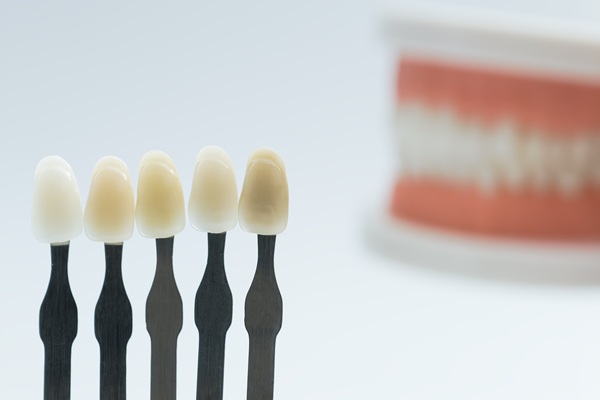Dental Implant Restoration: Prosthetic Root and Crown

Dental implants are the gold standard in teeth replacement. These restorations are durable and biocompatible. Most people prefer durable and stable dental prosthetics to removable dentures. Implants owe their security to the prosthetic root and dental crown. If you want to know how the prosthetic root and crown help dental implants become stable and strong, here are the details.
The procedure
The dentist will cut into the gum tissue. This exposes the jawbone. Then, the dentist will drill an implant hole into the jawbone. Placing the titanium post will follow. The dentist will stitch the gum tissue close. Doing so will help the implant site heal.
The prosthetic root should fuse with the jawbone and gum tissue. This takes about four to six months to heal. Then, the dentist will attach the abutment. Placement of the prosthetic dental crown will follow after two weeks. This completes the establishment of dental implants.
The prosthetic root
This is the titanium rod the dentist places in the jawbone. It serves as an artificial root. Prosthetic roots are important parts of dental implants. They must fuse with the jawbone to become the strong foundations for artificial teeth.
A good candidate for receiving the prosthetic root is an individual with good jawbone mass. A bone graft can add more bone to the thinning jawbone. This procedure will thicken the jawbone, giving the titanium rod enough support. The dentist will proceed with placing the dental implants after complete healing.
It will take several months for dental implants to complete their osseointegration. The next vital part of these restorations is the abutment. An abutment connects the metal root to the prosthetic crown. It supports the dental crown as well.
Jawbone loss happens as soon as the tooth separates from its socket. The body wants to recycle all unused resources in it. It takes the minerals from the rootless section of the jawbone. The prosthetic root is necessary because it preserves the jawbone. It stimulates the jawbone, letting the body know it should still send nutrients to that area. This keeps that area of the jawbone strong and stable.
The dental crown
Dental implants will need dental crowns to complete teeth replacement. Crowns stay above the gumline. The abutment connects them to the titanium rods. Dental crowns are custom-fit parts of dental implants. The dentist will take impressions of the abutments and neighboring teeth. This will ensure the right fit and correct color of each crown.
The dentist will either screw or cement the dental crowns on their corresponding implants. Screwing the crown into the waiting abutment will enable the dentist to clean the area well. The only downside to this is that the screw might loosen over time. Cementing the crown to the abutment is a more permanent way to place the crown.
The ideal candidates
Dentists recommend dental implants for people with severely damaged or decayed teeth. These restorations are also for patients who cannot stand the discomfort from removable dentures or dental bridges. Having good oral health is also a plus in having dental implants. Bone grafting may be necessary if the patient does not have enough jawbone to support the implants.
The advantages
Dental implants can last for decades with proper care and maintenance. Titanium rods are biocompatible. The body does not reject them because these rods are not organic materials. Implants are also non-toxic.
After complete fusion, dental implants provide a natural dental replacement. It has the strength, stability, and aesthetic value of natural teeth. The dentist can match the custom implant to the neighboring healthy teeth. Eating, smiling, and speaking are easier with stable implants than with removable dentures. Performing dental care practices is easier as well with these restorations.
Dental roots stimulate the jawbone. Nutrients go straight to this area to keep the jawbone strong and thick. Losing teeth leads to the loss of dental roots. Having dental implants can prevent jawbone loss. The titanium rods act as dental roots. These artificial roots signal the body to send nutrients to the jawbone for cell repair and growth.
Missing teeth can cause the neighboring teeth to loosen and shift. This results in bite problems and jaw issues. The individual feels pain while performing dental functions. Adjacent teeth stay stable and strong because of dental implants. Each implant stays in place and prevents neighboring teeth from shifting.
Dental implants are effective because of the strong prosthetic roots and the tailor-fit crowns
Managing tooth loss is better with dental implants. These are secure and stable restorations. You can talk, eat, and laugh with them without issue. You will not worry about them slipping out or wiggling in your mouth. Your dentist will determine if you are a good candidate for dental implants.
Are you considering getting dental implants in the Miami area? Get more information at https://implantfamilydentist.com.
Check out what others are saying about our dental services on Yelp: Dental Implants in Miami, FL.
Recent Posts
A dental implant is widely considered the tooth replacement solution that most closely resembles a natural tooth in durability, functionality, and appearance. However, like natural teeth, dental implants require diligent and consistent care to ensure longevity. Incorporating proper dental implant care into your oral hygiene routine can prevent complications and keep your smile healthy for…
Dental issues can impact confidence, health, and overall well-being. Fortunately, modern dentistry offers a transformative solution: teeth in a day. This procedure offers patients an option to fully restore the function and appearance of their smile in a single appointment, removing the need for multiple visits over several months. With advancements in dental implant technology,…
Many people resort to using dentures instead of dental implants in managing tooth loss. Dentures may restore the look of the lost tooth or teeth, but they do not compare to implants. Many dentists may recommend shifting to implants. The goals are to increase comfort and improve function. If you want to know how to…
Full mouth dental implants are an option that many patients choose when they need to replace their missing teeth. Our smile is the first impression we have when meeting a new person. We all want that impression to be warm and welcoming. When our smile is somewhat imperfect, we tend to lack confidence and feel…


